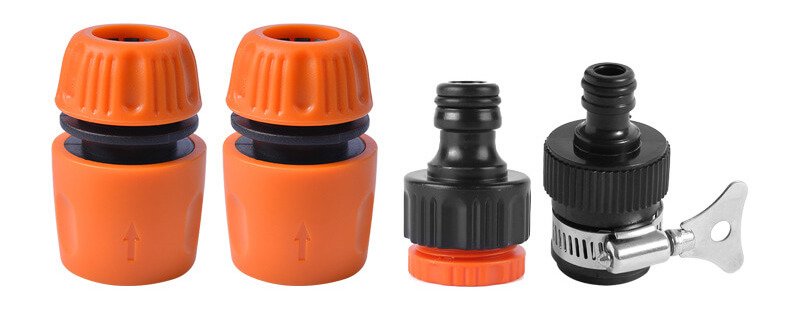When it comes to garden maintenance, one of the most important tools you’ll need is a hose connector. These simple yet crucial fittings allow you to easily connect your garden hose to water sources, sprinklers, and other outdoor equipment. While metal connectors like brass and aluminum are popular choices, plastic hose connectors have gained significant attention for their affordability, lightweight design, and ease of use.
However, like any product, plastic hose connectors come with their own set of advantages and disadvantages. In this article, we’ll explore both the pros and cons of plastic hose connectors, so you can determine if they are the right choice for your garden needs.

What Are Plastic Hose Connectors?
Plastic hose connectors are fittings designed to link a garden hose to various devices such as faucets, sprinklers, and irrigation systems. They are commonly made from materials like PVC (Polyvinyl Chloride), polypropylene, or ABS (Acrylonitrile Butadiene Styrene), all of which are known for being durable yet lightweight.
Plastic connectors come in different shapes and sizes, ranging from quick-connect fittings to more traditional threaded designs. These connectors are designed to be easy to attach and detach, making them perfect for garden use, where frequent connections and disconnections are required.
In addition to their functional benefits, plastic hose connectors are available in a wide variety of designs and colors, giving users the flexibility to choose a connector that suits both their aesthetic preferences and practical needs. Whether you’re working with a small home garden or a more extensive outdoor setup, plastic hose connectors are an accessible and cost-effective solution.
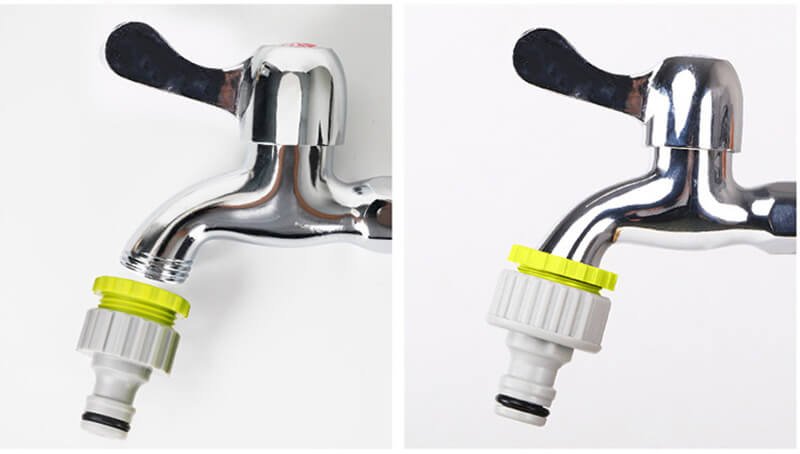
Pros of Plastic Hose Connectors
Plastic hose connectors offer a range of benefits that make them a popular and practical choice for many gardeners and homeowners. Here are some of the key advantages:
1. Cost-Effective
One of the most appealing aspects of plastic hose connectors is their affordability. Compared to metal alternatives like brass or aluminum, plastic connectors are significantly less expensive, making them a budget-friendly option for equipping your garden with multiple connectors.
2. Lightweight and Easy to Handle
Plastic hose connectors are lightweight, making them much easier to handle compared to metal options. Whether you’re connecting or disconnecting the hose, the reduced weight means you’ll tire less quickly during use. This is especially important for people who spend a lot of time working in the garden.
3. Corrosion-Resistant
Plastic connectors are naturally corrosion-resistant. Unlike metal connectors, they won’t rust or degrade when exposed to moisture and rain. This makes them ideal for use in wet environments or outdoor conditions, where metal fittings might suffer from rust and other forms of wear over time.
4. Variety of Designs
Plastic hose connectors come in a wide variety of shapes, sizes, and designs, which gives users plenty of options to match their specific needs. Whether you need a quick-connect fitting for convenience or a threaded connector for a more secure connection, plastic offers a range of solutions for different garden setups.
5. Easy to Use
Plastic connectors are generally designed with user-friendly features, such as quick-connect mechanisms. These features make the connectors simple and quick to attach and detach, which is ideal for frequent use. This convenience saves time and effort, especially when switching between various gardening tools or hoses.
6. Non-Reactive
Plastic is non-reactive to water, meaning it won’t leach harmful chemicals into your water supply. This makes plastic hose connectors an excellent choice for those who rely on clean, uncontaminated water for gardening, irrigation systems, or other outdoor water uses.
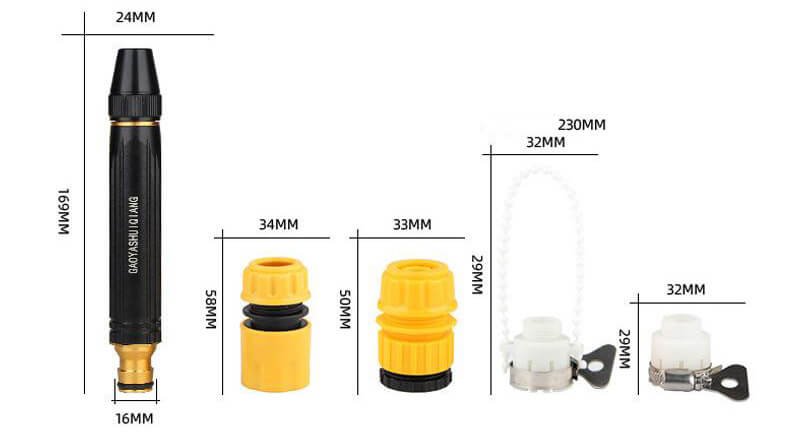
Cons of Plastic Hose Connectors
While plastic hose connectors offer many advantages, they also come with a few drawbacks that should be considered before making a purchase. Let’s explore the key disadvantages of using plastic hose connectors.
1. Durability Issues
One of the major downsides of plastic hose connectors is their relative lack of durability. Compared to metal connectors, plastic is more prone to cracking, breaking, or splitting under pressure or impact. Over time, plastic connectors can become brittle, especially when exposed to harsh conditions or heavy use.
2. Limited Strength
Plastic connectors are not designed for high-pressure applications. Heavy-duty tasks or situations that require high water pressure may cause plastic connectors to fail or leak. If you’re using your hose in high-pressure irrigation systems or with power washers, a metal connector might be a better option for added strength and security.
3. Environmental Impact
Most plastic hose connectors are made from non-biodegradable materials, meaning they won’t decompose naturally in the environment. Over time, plastic waste can accumulate in landfills, contributing to plastic pollution. For environmentally-conscious consumers, this can be a significant concern, especially if the connectors are not recyclable.
4. Temperature Sensitivity
Plastic hose connectors can be sensitive to extreme temperatures. In cold weather, plastic can become more brittle and may crack if exposed to freezing temperatures. On the other hand, high heat or prolonged exposure to the sun can cause plastic to warp or degrade. This makes plastic connectors less reliable in extreme weather conditions compared to metal connectors.
5. Wear and Tear Over Time
Although plastic connectors are generally corrosion-resistant, they can still experience wear and tear over time. Exposure to sunlight, UV radiation, and harsh chemicals can cause plastic to degrade, leading to cracks, fading, or reduced effectiveness. After prolonged use, you may find yourself needing to replace plastic connectors more often than their metal counterparts.
While plastic hose connectors are affordable and convenient, their fragility, limited strength, and sensitivity to temperature make them less suitable for all applications. It’s important to weigh these disadvantages against their benefits to determine if they’re the right choice for your specific needs.
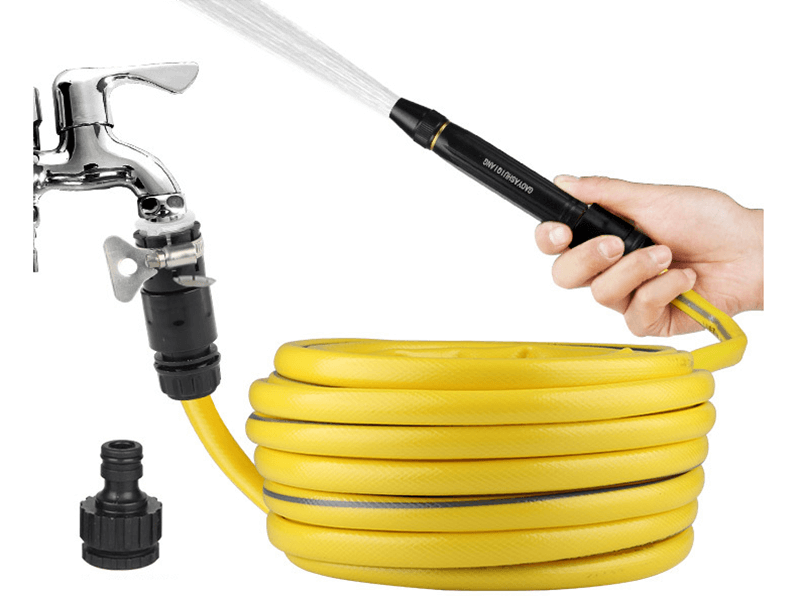
When to Choose Plastic Hose Connectors
Plastic hose connectors are a great choice in certain situations where their advantages outweigh the drawbacks. Here are some scenarios where plastic connectors might be the best option:
1. Budget-Friendly Options
If you’re looking for an affordable solution, plastic hose connectors are a great choice. Since they are generally much cheaper than metal connectors, they allow you to equip your garden without breaking the bank. For homeowners on a budget, plastic connectors offer significant savings.
2. Low-Pressure Applications
Plastic connectors are perfect for low-pressure water systems. If you’re using your hose for watering plants, washing cars, or other tasks that don’t require high water pressure, plastic connectors will do the job effectively and efficiently. Their lightweight and easy-to-use features are perfect for everyday garden maintenance.
3. Casual Garden Use
If you’re an occasional gardener or someone who doesn’t frequently use a hose, plastic hose connectors will likely meet your needs. Their easy handling and low cost make them ideal for individuals who don’t need heavy-duty equipment for their garden.
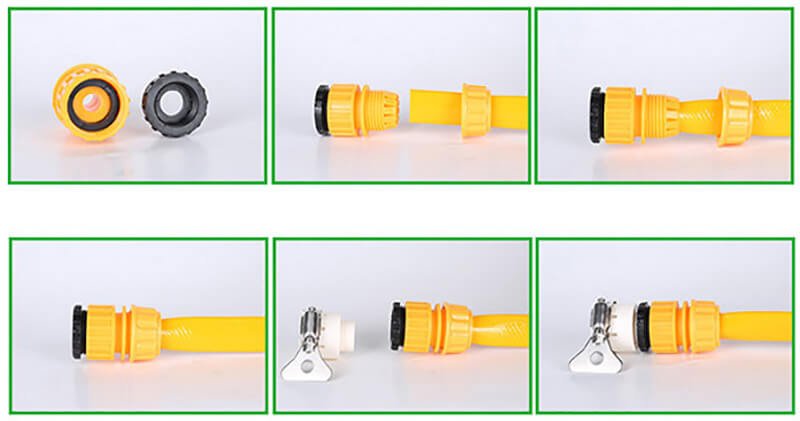
When to Consider Alternatives
While plastic hose connectors are suitable for many situations, there are times when you may want to consider other types of connectors. Here are some scenarios where alternatives might be more appropriate:
1. High-Pressure Systems
If your garden hose is used in high-pressure systems (such as power washers or irrigation setups that require strong water flow), you may want to opt for metal connectors. Plastic connectors can’t withstand high pressure as well as metal options, and they may crack or leak under such conditions.
2. Extreme Weather Conditions
For regions with extreme temperatures (either freezing cold or extreme heat), plastic connectors may become brittle or degrade over time. In these cases, metal connectors may offer better durability and reliability in harsh climates.
3. Long-Term Investment
If you’re looking for a more long-lasting solution and plan to use your hose for years to come, metal hose connectors (such as brass or aluminum) may provide greater value. They are more durable and can handle repeated use without the same risk of cracking or breaking as plastic connectors.
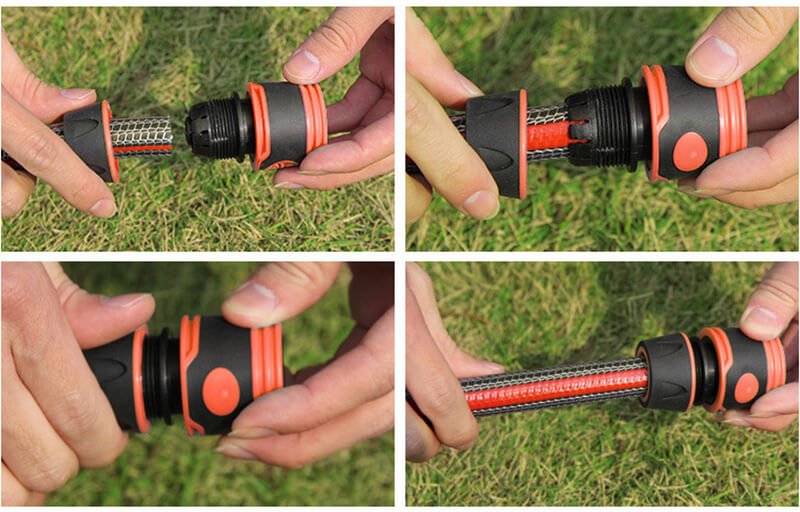
Conclusion
Plastic hose connectors offer an excellent combination of affordability, lightweight design, and ease of use, making them a great choice for many everyday gardening tasks. However, they come with their own set of limitations, such as fragility and limited strength, which may make them unsuitable for high-pressure or extreme conditions.
When deciding whether to choose plastic hose connectors, consider factors like budget, usage frequency, and the pressure requirements of your system. For low-pressure, casual, or budget-conscious gardening, plastic connectors are a fantastic solution. However, for more demanding tasks, metal alternatives may be better suited to ensure long-lasting performance and reliability.

